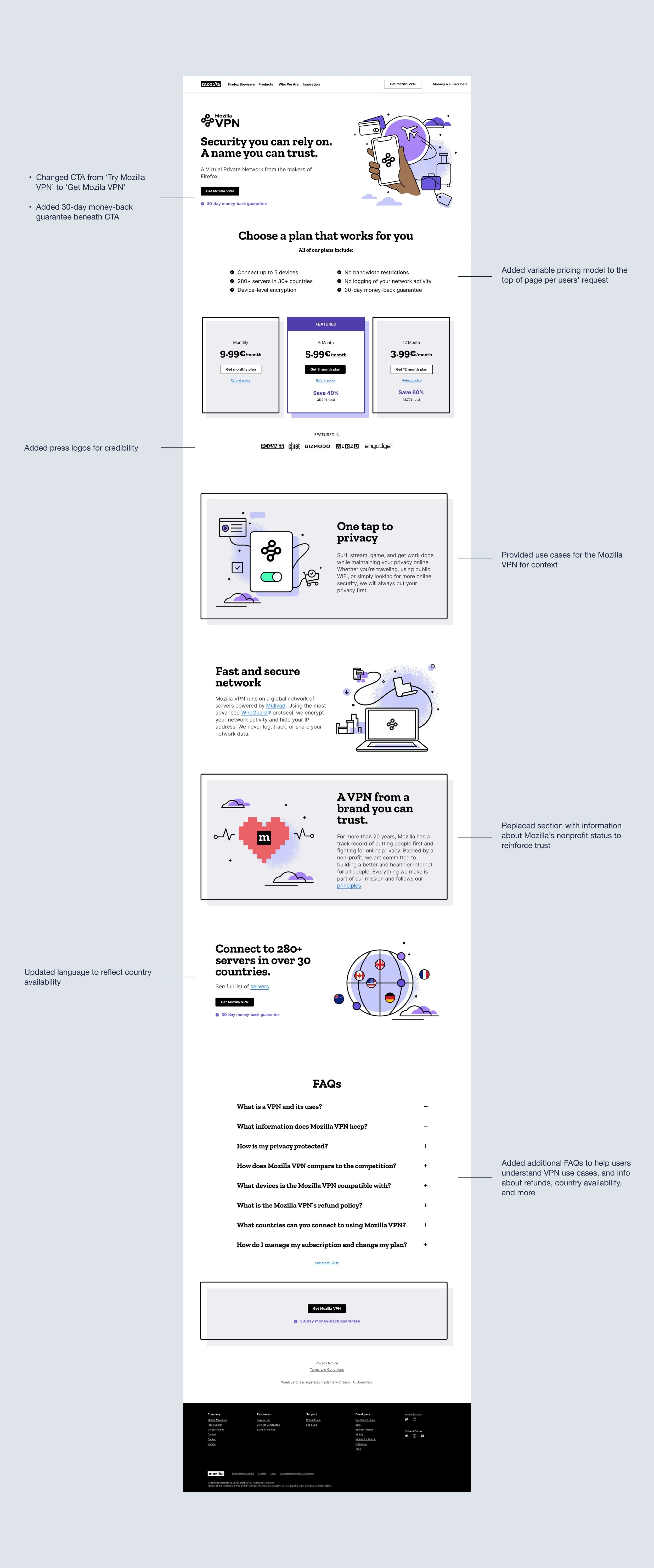MOZILLA
User testing across multiple European locales to inform the launch of Mozilla’s VPN product.
Overview
Mozilla’s European Marketing team worked to bring its first paid privacy product, the Mozilla VPN, to Europe. We were tasked with creating localized product pages for France and Germany, and the UK, accounting for the needs of users in those markets.
Metrics
150K global subscribers
60K European subscribers
Outcome
Through user testing of the page with German, French, and UK users, we surfaced the desire for a variable pricing model, delivering more choice and clarity surrounding VPN cost. We reached a total of 100K global subscribers and 42K European subscribers.
Visual Audit
I kicked off the project by conducting a visual audit of the competitor landscape to better understand patterns and best practices of other VPN products.
Testimonials
Competitors boosted credibility with press and customer logos
Prominent Pricing
Pricing across sites was boldly displayed at the top of the page
Clear CTAS
CTAs used the word ‘Get’ to show a direct offering to the customer
Testing Methodology
I developed a user testing plan on the content and messaging of the existing landing page to discover user impressions and pain points. Our in-house copywriters then translated the landing page and test questions to German and French. We launched our test on usertesting.com, gathered feedback, and synthesized findings in a collaborative workshop.
Locales: France, Germany, UK
Participants: 10 per locale
Platform: UserTesting.com
Findings & Recommendations
Finding 1
Interest in Pricing
“I would like to know what the overall price is if you’re going to have a monthly bundle or a yearly bundle”
Recommendation
• Introduce more pricing options
• Move up the pricing section
Finding 2
Need for Use Cases
“I feel like you could tell me a little bit more for other reasons that I don’t use it that I don’t know”
Recommendation
• Explain use cases in the FAQ section
Finding 3
Confusion About CTA
“Does ‘Try Mozilla VPN’ mean it’s free?”
Recommendation
• Update CTA w/clearer language
• Add a money-back guarantee beneath CTA
Finding 4
Desire for Proof of Trust
“I needed more assurance on why it’s so secure.”
Recommendation
• Add a section about Mozilla’s nonprofit status
• Add press logos
Visual Research
Because of the strong interest in pricing seen from users in our qualitative testing, we decided to implement a variable pricing model into the VPN landing page. By conducting an audit of competitor and comparator sites, I identified patterns and best practices in variable pricing models.
Highlight top plan
I discovered that recommended plans were emphasized through color, hierarchy, or small banners indicating ‘best value’ or ‘top plan.’
List Features
Features were listed within individual plans if offerings varied or beneath plan options if offerings were the same for all.
Limit Choices
Among the plans audited, no more than four subscription choices were presented. This signaled to keep options minimal.
Visual Exploration
I designed a variety of layouts, experimenting with treatments to emphasize a selected plan through visual hierarchy and language, and considered various placements of the feature offerings.
Final Pricing Model Design
The final design I landed on boldly presented all of the features the plans offered upfront, bringing attention to the recommended plan through the language, color, and CTA treatment. The visual treatment of the cards ensured consistency.
Revised Landing Page Design
Finally, I implemented the recommendations from my research findings to optimize the landing page. The result was a page that addressed our user needs through clear language, an emphasis on security and trust, and Mozilla’s credibility in the privacy space. The variable pricing model provided users with choice and control.














